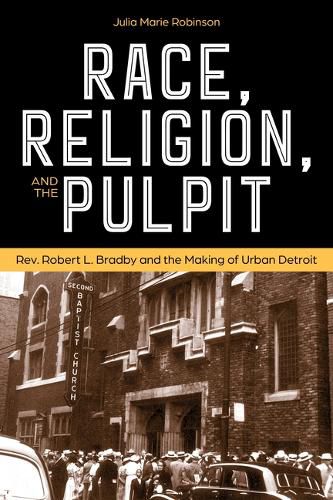Readings Newsletter
Become a Readings Member to make your shopping experience even easier.
Sign in or sign up for free!
You’re not far away from qualifying for FREE standard shipping within Australia
You’ve qualified for FREE standard shipping within Australia
The cart is loading…






The history of one man's work during the Great Migration to create a cultural cornerstone for Detroit's African American community.Black churches were essential community centers that made, reshaped, and galvanized urban areas during the Great Migration. In Detroit, there was one church and one minister in particular that demonstrated this power of the pulpit-Second Baptist Church of Detroit and its nineteenth pastor, the Reverend Robert L. Bradby. In Race, Religion, and the Pulpit: Rev. Robert L. Bradby and the Making of Urban Detroit, author Julia Marie Robinson explores how Bradby's church became the catalyst for economic empowerment, community building, and the formation of an African American working class in Detroit. Robinson highlights Rev. Bradby's efforts as an activist and "race leader" by examining the role the minister played in high-profile events, such as the organizing of Detroit's NAACP chapter, the Ossian Sweet trial of the mid-1920s, the Scottsboro Boys trials in the 1930s, and the controversial rise of the United Auto Workers in Detroit in the 1940s.
$9.00 standard shipping within Australia
FREE standard shipping within Australia for orders over $100.00
Express & International shipping calculated at checkout
The history of one man's work during the Great Migration to create a cultural cornerstone for Detroit's African American community.Black churches were essential community centers that made, reshaped, and galvanized urban areas during the Great Migration. In Detroit, there was one church and one minister in particular that demonstrated this power of the pulpit-Second Baptist Church of Detroit and its nineteenth pastor, the Reverend Robert L. Bradby. In Race, Religion, and the Pulpit: Rev. Robert L. Bradby and the Making of Urban Detroit, author Julia Marie Robinson explores how Bradby's church became the catalyst for economic empowerment, community building, and the formation of an African American working class in Detroit. Robinson highlights Rev. Bradby's efforts as an activist and "race leader" by examining the role the minister played in high-profile events, such as the organizing of Detroit's NAACP chapter, the Ossian Sweet trial of the mid-1920s, the Scottsboro Boys trials in the 1930s, and the controversial rise of the United Auto Workers in Detroit in the 1940s.